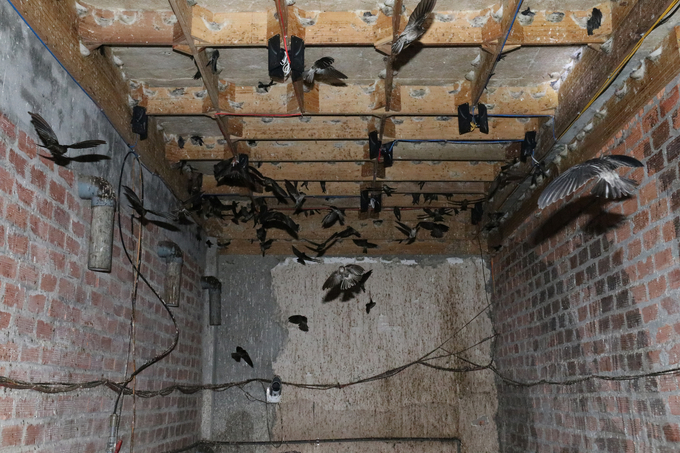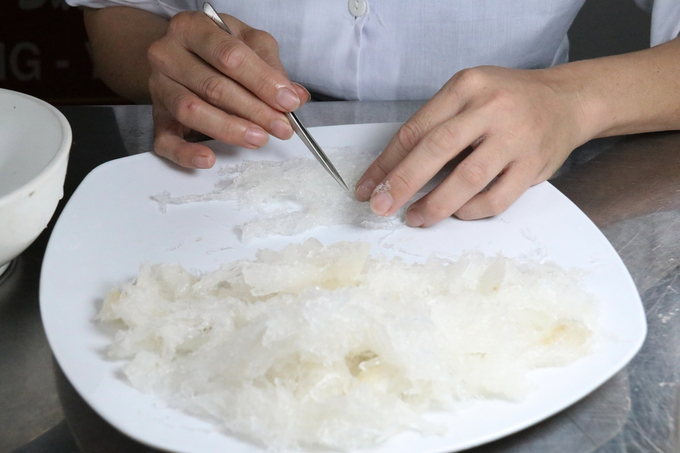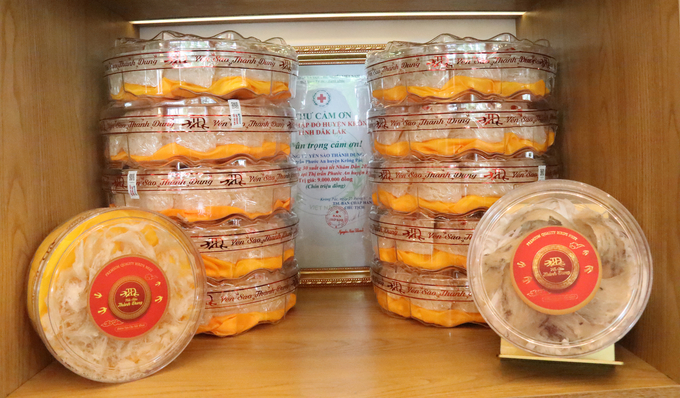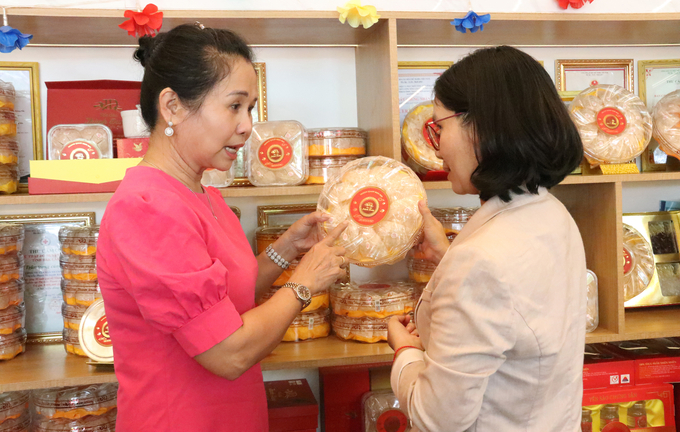May 29, 2025 | 15:52 GMT +7
May 29, 2025 | 15:52 GMT +7
Hotline: 0913.378.918
May 29, 2025 | 15:52 GMT +7
Hotline: 0913.378.918

Currently, Dak Lak has over 1,000 swiftlet nest farms, with significant potential for export. Photo: Quang Yen.
The quality of swiftlet nests in Dak Lak is highly regarded, but the market outlet has not been stable. A business recognized the potential of this product and intends to establish the Dak Lak swiftlet nest brand for official export to the Chinese market.
In recent days, swiftlet nest farmers in Krong Pac district (Dak Lak) have collaborated with Thanh Dung Bird's Nest Import And Export Joint Stock Company, celebrating the completion of the final procedures for official export to the Chinese market.
To prepare for official export, Thanh Dung Bird's Nest Import And Export Joint Stock Company has collaborated with dozens of households with more than 40 nest houses in Dak Lak and Gia Lai.
Mrs. H'Mó H'Loan (residing in Ea Hiu commune, Krong Pac district) mentioned that her family started raising swiftlets in 2018. Up until now, her family has harvested 4 kg of nests every 3 months.
According to Mrs. H'Mó H'Loan, the longer the swiftlets are raised, the higher the yield will be. "Since our family has only been raising them for over 5 years, the yield is still low. Currently, the product is sold retail for over 30 million VND/kg when cleaned. However, our swiftlets do not have a stable market outlet; they are sold inconsistently," Mrs. H'Mó H'Loan said.
She added that, upon hearing about the export opportunity, her family learned about Thanh Dung Bird's Nest Import And Export Joint Stock Company. Currently, her family has completed the necessary procedures to link and produce swiftlets according to export standards.
"When linking, we don't need to know the price, but we need a stable market outlet. When encouraged and linked for export by the company, our family has received a lot of support. Currently, the quality of Dak Lak's swiftlet nests surpasses those from other places. We also have a swiftlet nest house in Gia Lai, but the nests there are not as beautiful as those in Dak Lak. Therefore, our family also hopes to establish the Dak Lak swiftlet nest brand for export," Mrs. H'Mó H'Loan added.
Similarly, Mr. Bui Van Thuc (residing in Phuoc An town, Krong Pac district) has 2 nest houses that are being harvested. According to Mr. Thuc, currently, one nest house yields over 79 kg/year, while the other, which has just started yielding, has not produced much.
"Currently, the product's market is mainly local. Recently, I also participated in trade promotion delegations from the local area to introduce the product in northern provinces, but the market outlet is still uncertain," Mr. Thuc said.
He added that Dak Lak's swiftlet nests have a brand and the quality of the product is only inferior to Khanh Hoa and surpasses many other regions due to their high nutritional content.
"Before, people raised and sold the nests on their own. When there is a company for official export, we're delighted as the market outlet for the product will be more stable. If we can export, it's good news because we will have a reliable market outlet. The price of swiftlets is good now, but if there are too many swiftlets, the price will decrease. Therefore, if we can officially export, the market outlet will be more stable," Mr. Thuc shared.
According to Mr. Thuc, raising swiftlets involves 4 factors: negative ions, humidity, light, and air. If the homeowner cannot meet these 4 factors, raising swiftlets will not be successful. "The technique of raising swiftlets is very important. Without it, failure is likely. The collaboration will help people learn the techniques and methods of raising swiftlets, especially with a stable market outlet and good prices," Mr. Thuc added.

Thanh Dung Bird's Nest Import And Export Joint Stock Company is currently collaborating with many households for official export to the Chinese market. Photo: Quang Yen.
Mrs. Pham Thi Phuong Dung, Chairwoman of the Board of Directors of Thanh Dung Bird's Nest Import And Export Joint Stock Company, stated that the company began building swiftlet nest houses in 2015. Up until now, Thanh Dung has products related to swiftlet nests such as refined swiftlet nests, raw swiftlet nests, and recently introduced the market to the product "whipped yogurt with dried swiftlet nests." The company is also researching to produce dried fresh swiftlet nests.
"In 2021, our family built an OCOP product and received a 3-star certification. By 2022, we upgraded to a 4-star product. Having raised swiftlets for over 10 years, our family recognizes the favorable potential for development in the Central Highlands in general and Dak Lak in particular. The quality, fragrance, and texture of Dak Lak's swiftlet nests are remarkable. Dak Lak's swiftlet nests are of superior quality, even better than those from other regions. So far, our unit's products have not been officially exported to other countries. However, some customers have taken the company's products to other countries for sale. Many customers are already familiar with Thanh Dung Swiftlet Nest products," proudly shared Mrs. Pham Thi Phuong Dung.

Thanh Dung Swiftlet Nest, is a 4-star OCOP-certified product in Dak Lak. Photo: Quang Yen.
The Chairwoman of the Board of Directors added that, after receiving information about official exports to the Chinese market, the company immediately began compiling documentation. Currently, Thanh Dung Company has registered an account with the General Department of Customs of China.
"The documentation for establishing swiftlet nest houses and linked swiftlet nest houses has been approved by the Department of Animal Health and sent to China for verification. The company is collaborating with over 40 swiftlet nest households in Krong Pac district and some other areas, with an annual production of around 6 tons of swiftlet nests," the Chairwoman of the Board of Directors further explained.
According to Mrs. Dung, through this collaboration, the company has guided households on technical aspects to ensure export-quality products. The company has also provided necessary support to address any deficiencies among the local residents.
"In the Central Highlands, Thanh Dung Bird's Nest Import And Export Joint Stock Company is the only one undertaking the steps for swiftlet nest export. Therefore, the company also wishes to cooperate and expand its partnerships with households engaged in swiftlet nest farming.
However, the process of building export documentation has faced several challenges for the company. Currently, swiftlet nests are considered a consumable food item, making the documentation process complex. An important issue in export is disease control, such as H5N1 avian influenza or other livestock diseases. The company hopes that relevant authorities will provide support and guidance on procedures to expedite the export process," shared the female leader.

Mrs. Pham Thi Phuong Dung, Chairwoman of the Board of Directors of Thanh Dung Bird's Nest Import And Export Joint Stock Company, stated that the company aims to establish the Dak Lak swiftlet nest brand for export. Photo: Quang Yen.
According to Mrs. Dung, recently the company visited China and signed a cooperative export agreement. Initially, the partner company did not set overly high demands on production volume due to capacity constraints. Initially, the partner provided conditions for exporting according to capacity. Once stable export is achieved, the partner is willing to cooperate in investment and establish additional factories in Vietnam.
The company is focused on three main product lines: refined swiftlet nests, dried swiftlet nests, and swiftlet nest beverages. The company has not yet ventured into refined products and will select products that showcase strengths for export.
Upon entry into the market, development will depend on customer requirements. The company aims to establish the Dak Lak swiftlet nest brand for export. Only when the swiftlet farmers have a legitimate market will they have stable outlets," Mrs. Dung said.
According to surveys, Dak Lak province currently has over 1,000 swiftlet nest farming households, primarily concentrated in Buon Ma Thuot city, Ea Kar, Krong Pac, Krong Buk districts... Despite its significant development potential, the swiftlet farming industry in the province remains largely spontaneous, lacking strong connections and information sharing among farmers and between farmers and processing facilities. There are also some shortcomings in terms of the quality of the swiftlet nests, swiftlet house equipment, environment... while technical information, market information, and government policies are lacking.
Translated by Nguyen Hai Long
/2025/05/25/4127-3-073637_820.jpg)
(VAN) Thanks to the promotion from an FAO-implemented project, vegetable production in greenhouses in Moc Chau has seen strong development, from 1.5 hectares in 2021 to nearly 50 hectares in 2024.

(VAN) FAO has recently supported USD 140,000 to implement the project 'Risk mitigation human-animal interface risks through disease control initiatives in pig farming.'

(VAN) The People's Committee of Tra Vinh province has approved an adjustment to the investment policy for the Green Hydrogen Plant project, increasing its area to approximately 52.76 hectares.
![Reducing emissions from rice fields: [2] Farmers’ commitment to the soil](https://t.ex-cdn.com/nongnghiepmoitruong.vn/608w/files/news/2025/05/05/dsc08881jpg-nongnghiep-140632.jpg)
(VAN) Clean rice cultivation model in Thuong Tan commune, Bac Tan Uyen district, is assisting local residents in achieving sustainable agriculture by substantially reducing costs, increasing productivity, and protecting the environment.

(VAN) At the conference to disseminate Resolution No. 68, AgriS introduced its digital agricultural ecosystem and reaffirmed its commitment to accompanying the Government in promoting private sector development and sustainable agriculture.

(VAN) 'Blue Ocean - Blue Foods' initiative is designed to restore marine ecosystems and establish sustainable livelihoods for local communities by cultivating a minimum of 1,000 hectares of cottonii seaweed in the first three years.
/2025/05/21/4642-3-112707_603.jpg)
(VAN) The V-SCOPE project has made direct contributions to three out of six pillars of the Comprehensive Strategic Partnership between Vietnam and Australia.